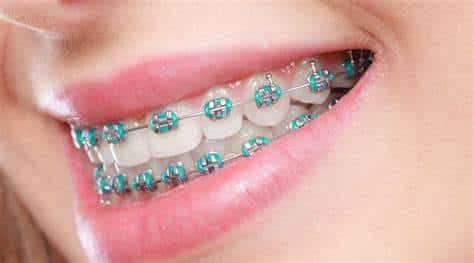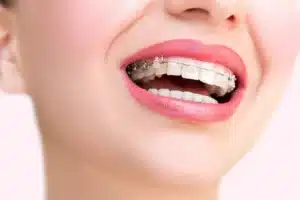Have you ever wondered what metal braces are actually made of? Understanding metal braces materials can help you feel confident about the treatment and what’s going in your mouth. Today’s braces have evolved to be more comfortable, effective, and safer than ever before. Made from high-quality metals like stainless steel, each part works together to gradually straighten your teeth. Whether you’re considering braces for yourself or a family member, knowing what’s involved can make the journey feel easier and even a little exciting. Let’s take a closer look at what makes these braces both tough and reliable.
What Are Metal Braces Made Of?
When you get metal braces, you might wonder: what exactly are they made from? Most metal braces materials include high-grade stainless steel, which is tough and long-lasting. Some braces also use titanium alloys or mixes of metals like chromium, nickel, and cobalt. These metals are chosen because they can safely stay in your mouth without causing any irritation.
What’s more, the metals used in braces are designed to resist corrosion from saliva and food, so they won’t rust or weaken. This focus on biocompatibility—meaning the materials work well with your body—helps prevent any allergies or reactions. All in all, these materials are carefully selected to ensure braces are strong, safe, and comfortable for daily wear. Understanding these materials can help you feel even better about the braces journey and the positive results ahead.
Key Components of Metal Braces
Brackets

Brackets are the small, square metal pieces attached to each tooth. They’re like tiny anchors for your braces and play a big role in making sure your teeth move in the right direction. Each bracket holds the archwire securely in place, guiding your teeth’s alignment over time. Made from sturdy metal braces materials like stainless steel, brackets are carefully designed to handle all the daily challenges of eating and brushing. Plus, they’re built to resist corrosion and food buildup, so they stay strong and effective throughout your treatment.
Archwire
The archwire is the flexible metal wire threaded through each bracket. This wire is what actually applies pressure to your teeth, slowly moving them into better alignment. Typically crafted from a stainless steel alloy, the archwire has to be both strong and flexible. This combination allows it to gently pull your teeth in the right direction without snapping or bending out of shape. Orthodontists may swap out or adjust the archwire during check-ups, fine-tuning the fit so your braces continue guiding your teeth properly as they shift into place.
Ligature Elastics
Ligature elastics are the tiny rubber bands that keep the archwire attached to each bracket. These elastics help make sure that the archwire stays secure and continues applying consistent pressure to your teeth. One fun part of these elastics is that they come in a variety of colors, allowing you to add a bit of personality to your braces. Your orthodontist changes them at each appointment, which gives you a fresh start with your favorite color or a new look every time. Together, these components make metal braces a strong and effective tool for straightening teeth.
Are the Brackets and Archwires Made of the Same Material?
While brackets and archwires are both key parts of metal braces, they’re usually made from slightly different materials to meet specific needs. Archwires are typically made of stainless steel alloys because they need to be flexible yet strong enough to gently guide teeth into alignment. This flexibility allows the archwire to apply steady pressure over time without bending out of shape. Brackets, on the other hand, are often crafted from a variety of metals chosen for their durability and comfort. Together, these materials work hand-in-hand to make braces both effective and comfortable for daily wear, keeping your smile on track.
Corrosion Resistance in Metal Braces
One of the great things about metal braces materials is their strong resistance to rust and corrosion. Braces are made from high-quality alloys that can handle daily exposure to saliva, food particles, and the constant movement of your mouth. This durability ensures that metal braces won’t easily break down or lose their strength, even with the challenges of day-to-day wear. The stainless steel and other alloys used are specially chosen for their lasting power, so your braces stay effective and safe throughout your treatment, providing a reliable path to a straighter, healthier smile.
Are Metal Braces Safe for Everyone?
Yes, metal braces are safe for almost everyone. The metal braces materials, like stainless steel and other high-grade alloys, are carefully chosen to be both effective and safe for daily wear. For people who are sensitive to metals like nickel, orthodontists offer alternative, nickel-free alloys that work just as well without causing irritation. Metal braces are FDA-approved, which means they meet strict safety standards and are safe for children, teens, and adults alike. If you’re concerned about allergies or specific materials, your orthodontist can guide you to the best options, making sure your braces journey is smooth and safe.
How Metal Braces Work
Metal braces work by gently guiding teeth into better alignment over time. Here’s how: the small brackets attached to each tooth hold a flexible archwire, which is the main tool in straightening. This archwire applies continuous, gentle pressure on the teeth, encouraging them to gradually shift into place. As the teeth begin to move, orthodontists can adjust the wire’s tension to keep the progress steady and on track. This regular adjustment, combined with durable metal braces materials, helps ensure a smoother, more precise outcome, giving patients a healthier and straighter smile over time.
Maintenance and Care for Metal Braces
Taking care of metal braces isn’t difficult, but a few simple steps can make a big difference. First, regular brushing and flossing are essential to keep food particles from getting trapped in the brackets and wires. Using a small, soft-bristle brush or even an interdental brush can help reach tricky spots. It’s also a good idea to avoid sticky and hard foods, like gum or popcorn, which can cause brackets to loosen or wires to bend. Rinsing with water after meals can help flush away food particles and keep your braces clean.
Regular check-ups with your orthodontist are also important. During these visits, the orthodontist will adjust the wires and make sure everything is moving along as planned. Following these basic care tips will not only make your braces more effective but also keep your teeth and gums healthy throughout your treatment.
Alternatives to Metal Braces
If metal braces don’t seem like the right fit, there are other options available. Ceramic braces work similarly to metal braces but use clear or tooth-colored materials, making them less noticeable. Invisalign aligners are another popular choice; these are clear, removable trays that gradually shift teeth into place. Both of these options are good for those who might have metal sensitivities or want a more discreet look. Your orthodontist can help you decide which option best meets your needs and lifestyle.
Final Thoughts
Choosing high-quality, safe metal braces materials makes a big difference in comfort and results. Understanding what braces are made of can help you feel more confident and prepared for your treatment. With durable, biocompatible metals like stainless steel, metal braces are designed to last while gently moving your teeth into place. Consulting an experienced orthodontist will ensure that you get a treatment plan tailored to your needs. With the right materials and a skilled professional, your braces journey can be a positive experience, leading to a healthy, beautifully aligned smile you’ll enjoy for years to come.
Ready for a Confident Smile?
If you’re considering braces, Holt Ortho offers personalized orthodontic care, using top-quality materials and the latest techniques for lasting, comfortable results. Take the first step toward a beautifully aligned smile by scheduling your consultation with Holt Ortho today!



